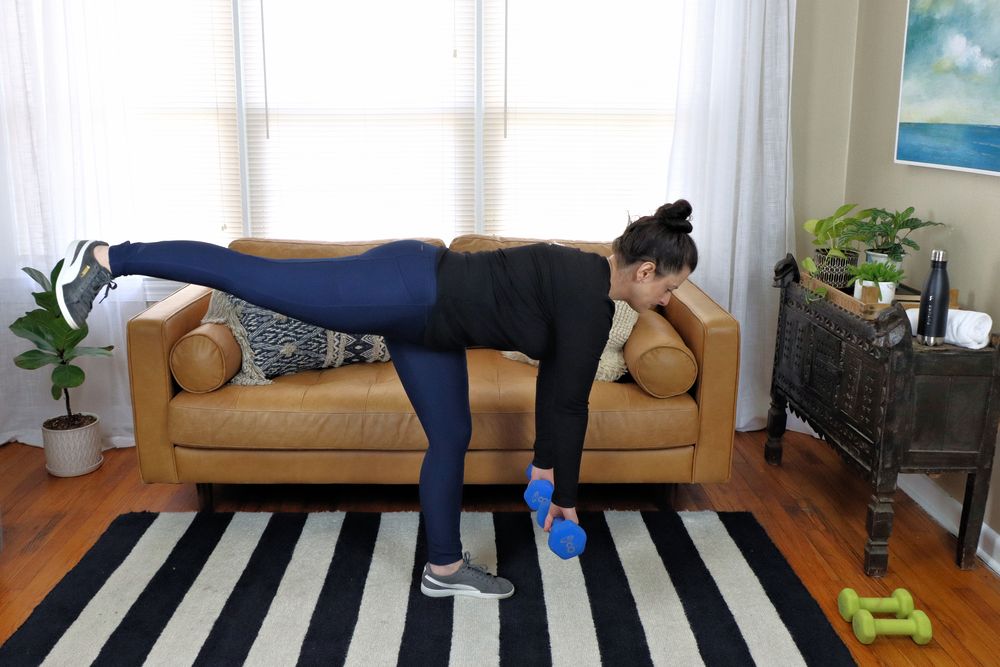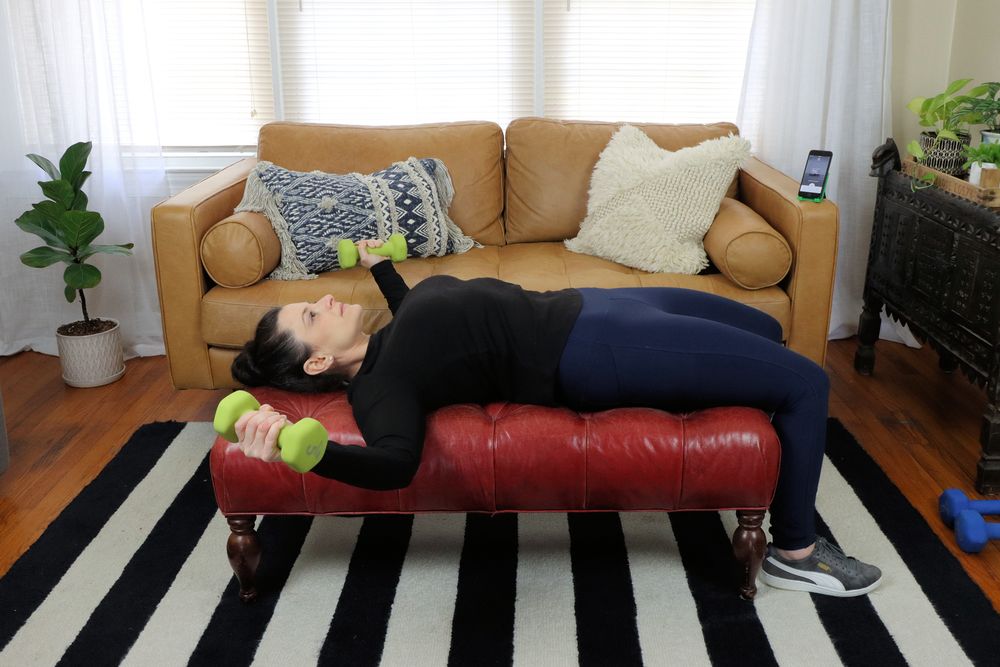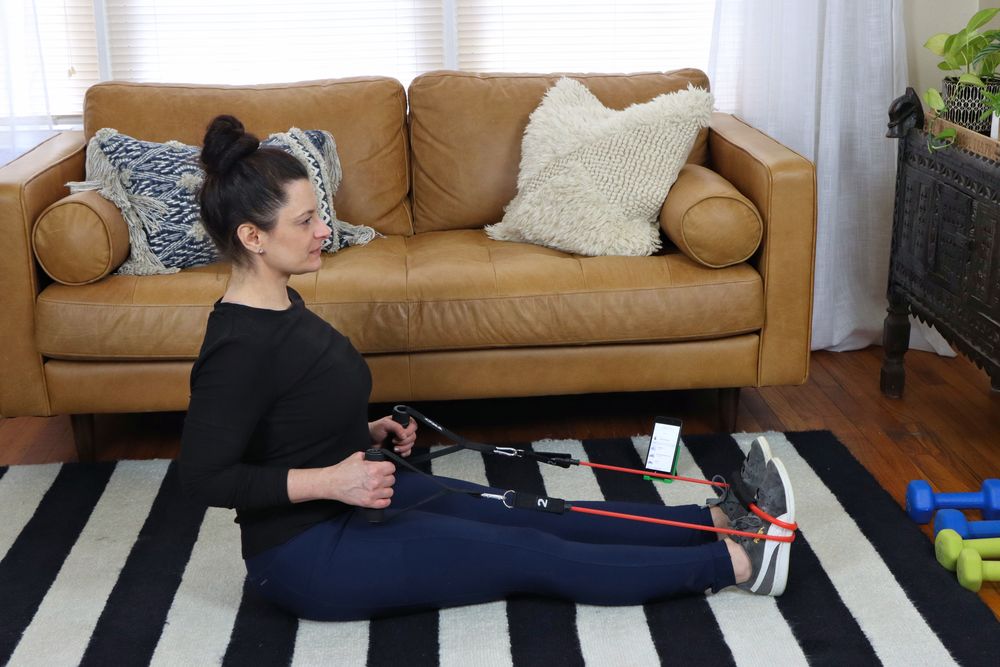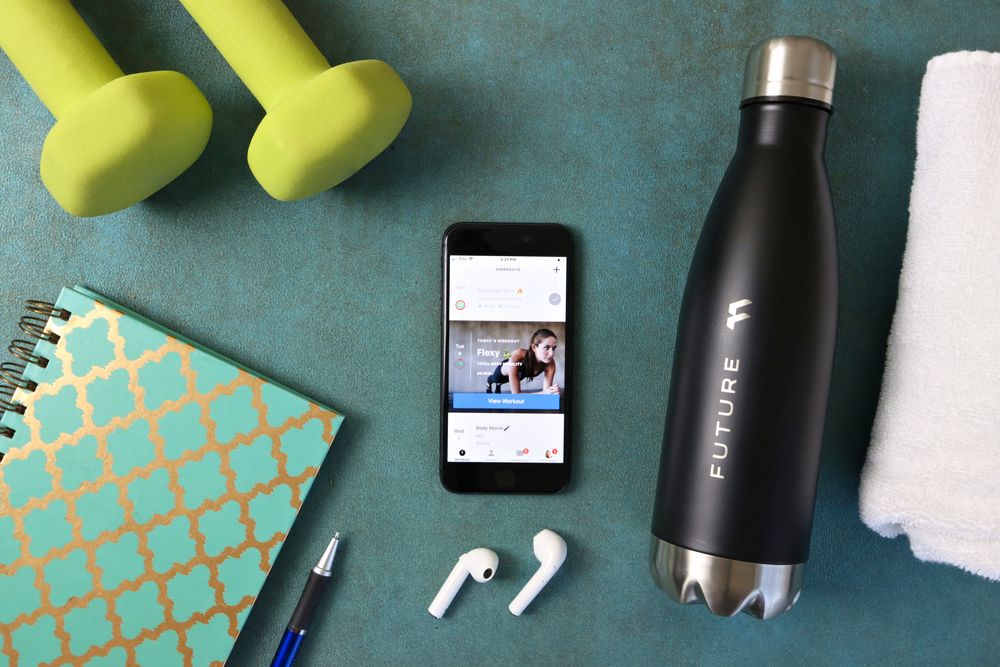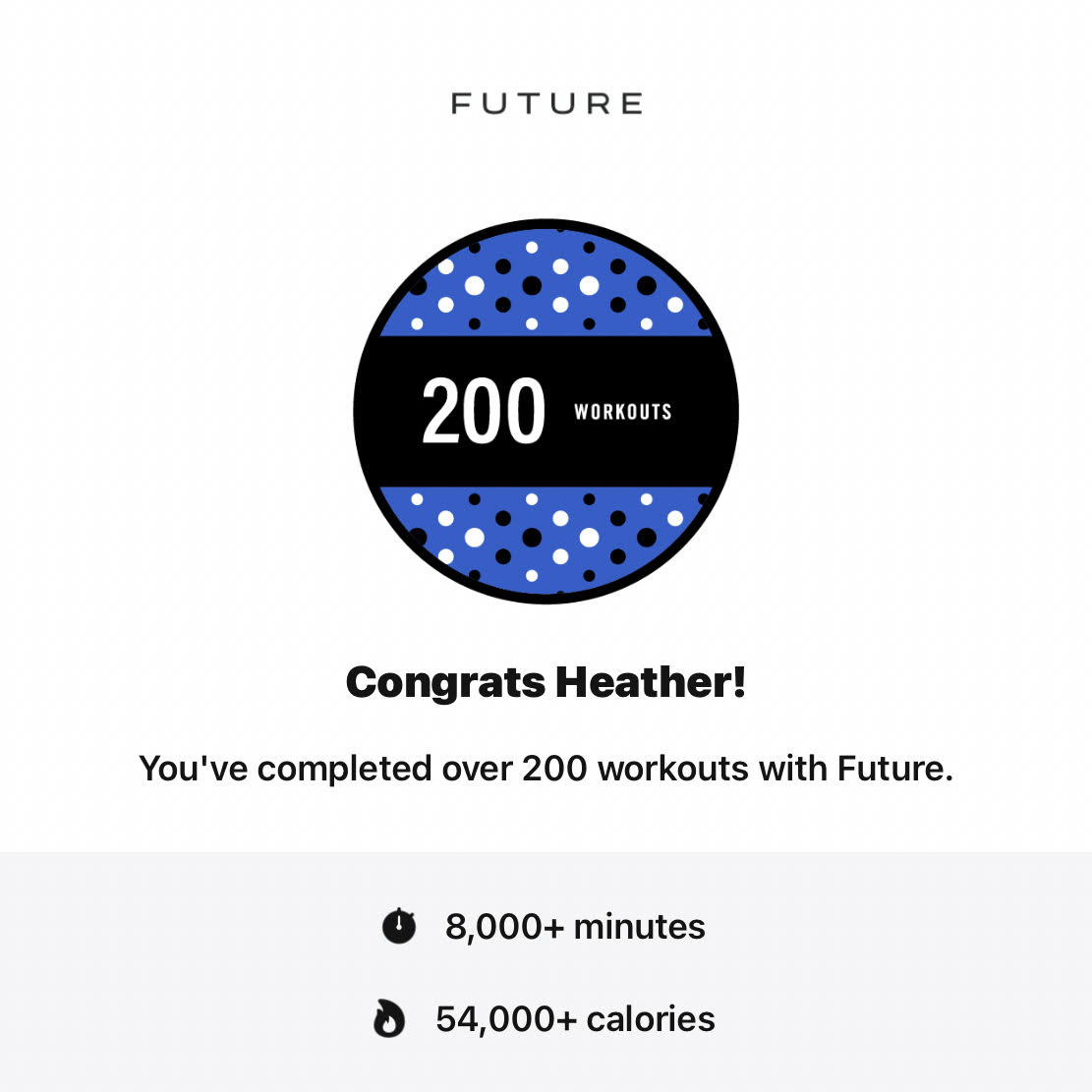Want to increase your strength and confidence while burning fat, building muscle, and boosting your metabolism? Then weight lifting at home can help you get there! What’s even better is that weight lifting can also reduce stress, boost heart health, and strengthen bones and joints.
As a beginner, you can start a simple, yet effective strength and weight lifting routine from the comfort of your own home. In fact, you don’t need a gym membership or expensive gym equipment to get started. And you can do it on your schedule.
Even better? No need to feel self-conscious while intimidating gym bros are slamming weights and grunting next to you. Should we talk about the other annoying things that go on in the gym? Let’s not go there. For now.
Here’s a few tips and tricks I learned when I began my home weight lifting routine, but found the gym scene too intimidating as a newbie.
1. First, Don’t Believe The Myths
First, many women stay away from weight lifting because they think it’s going to make them big and bulky. I wrongly believed that too, but it’s simply not true.
While weightlifting does build muscle (if done properly), women aren’t genetically built to put on muscle the same way men do. It can also take years to achieve that “bulked up” look some guys go for.
Another misconception is that you have to lift super heavy weights to get results. But research has shown that light weights can be just as effective at building muscle. You just need to do enough reps to the point your muscles are fatigued.
Lastly, you don’t need to workout every day to see results or get benefits. Beginning with 2 to 3 times per week is a great start.
2. Keep Weights Light And Focus On Form
Proper form is very important, whether you’re a beginner at weight lifting or you’ve been doing it for 10 years.
When starting out, aim to go lighter and get a feel for the proper form of the exercises and what muscles you should be engaging. This will ensure you’re doing the movements correctly, but also safely so you get the best possible results. You can also do them with body weight alone to gain stability and confidence in your movement.
Weight lifting books, fitness magazines, fitness websites, and YouTube videos are helpful resources. If you’re not sure where to start or you feel overwhelmed, getting an online fitness coach or trainer to guide you while you’re working out at home can help you skip the frustration of figuring out what you should be doing, and how many reps, and sets and what days. They can break it down for you and put you on a path to getting stronger and more toned with none of that beginner’s frustration.
I’ve been using the Future fitness app from the Apple store for almost a year now and I’m amazed at the progress I’ve made. For just $19, I selected one of their elite fitness coaches (many have trained Olympic, professional, and college athletes), then scheduled a Facetime consultation about my fitness level and health goals. Each week now my coach creates weekly custom workout routines designed specifically for me.
Each exercise in the routines also has instructional videos with audio cues and tips from my coach about my form. It’s like having a personal trainer with you every day while you’re working out from home.
I love how stress-free and easy it is and I’m seeing amazing results. My Future coach motivates and helps me out every day!
➡ Check out my full Future Fitness App Review here!
3. Use What You Have Around The House
Starting out, you don’t need an entire weight set as you would see at the gym. I started with just a beginner set of dumbbells and resistance bands from Target. But, if you don’t have any weights at home and aren’t ready to invest in a set yet, with a little creativity, you can start by using some simple weight-bearing items around the house.
Large soup or tomato cans, which mostly weigh about a pound (check the label for weight), can be used when doing longer sets of reps. Grab some empty plastic water or milk jugs and fill them with water or sand. You can also fill a reusable grocery tote with some cans or pantry goods.
Doing squats? Pick up some heavy bags of garden soil, pet food, or birdseed. An ottoman can double as a weight bench while you can do hip thrusts leaning up against the couch.
Weight is weight. Your body doesn’t know if you’re rocking the latest pair of Bala bands or a bag of rice from your pantry. It sounds crazy, but it works!
4. Increase Weight When It Feels Too Easy
The rule of thumb for what size weight you should use is to choose a weight amount that tires your muscles after about 12 to 15 exercise reps. You should be able to do 2-3 sets of each exercise. If you have your form down and you want to challenge yourself more, slowly add more weight.
As long as you’re working to about 70-90% failure, you’ll be building strength and muscle. Weight should never be so heavy that you feel you’re about to hurt yourself.
5. Don’t Neglect To Fuel Up Before And After Your Workout
If you want to see results with weight lifting, learning what and when to eat is crucial. Not eating enough can leave you feeling weak, fatigued, dizzy and even nauseous during your workout. It will also affect your workout performance as well as hinder any gains in muscle or strength you want to make.
Eating carbs before exercise can give you the energy you need to crush your workout. Eating a mix of carbs and protein after your workout can help glycogen stores replenish, while protein supplies amino acids to help build back muscle stronger after a workout.
If possible, you should also eat 3 to 4 small, well-balanced meals throughout the day. A food tracking app (there’s a ton of them) can help you track and figure out how much protein, carbs, fat (macros), and calories you should take in. These will vary depending on if you have weight loss or weight gaining goals.
Tip: Before working out, give yourself plenty of time to digest so you get the benefits of the nutrients and don’t feel full or bloated while exercising.
Here are the general rules.
Eat a normal meal 2-3 hours before working out
Focus on whole foods and meals that are 40% lean protein, 30% healthy carbs, and 30% healthy fats.
Go for a healthy light carb-rich snack about 30 minutes to 1 hour before your workout, like:
- A banana
- A rice cake with peanut butter
- An apple or pear
- Greek yogurt with granola and berries
- Dried fruit with mixed nuts
- A granola bar
- A smoothie
Eat protein and carbs within 1 hour after:
- Protein shake with banana
- Greek yogurt with berries
- Chicken with rice and veggies
- Salmon with sweet potato
6. Take Initial Measurements And Track Your Progress So You’ll Know If You’re Improving
Tracking your weight lifting progress is a great way to help you stay motivated and accountable for your workouts. But it’s also a great tool to show your starting point, progression, and if your routine needs tweaking. All you need is a notebook, journal, or note-taking app on your phone.
Start by taking body measurements. These should include your weight as well as the circumference of your body including your arms, chest, waist, hips, and thighs. A tape measure meant for sewing will give you the most accurate measurements. You could also use a piece of string and then hold it up to a ruler.
Measure Body Fat: If you belong to a fitness club already, ask if they are able to measure your body fat with calipers, which is a tool designed to do just that. Otherwise you can use a body fat calculator to estimate where you’re currently at.
Each time you workout write down:
- The date and time of the workout
- Each exercise with the number of sets and reps:
- How much weight you’re lifting for each exercise
For example: Dumbbell Goblet Squat: 25lbs – 3 sets/12 reps/60 seconds rest
About every 6 weeks, look back at your notes to see if you’re progressing. You should be slowly adding more weight or more reps if you don’t have access to more weight. You can also do variations or increase the intensity.
7. Weight Lift At Home 2-3 Times Per Week To Start
You don’t need to weightlift every day to see results. Aim for 20 to 30-minute sessions, 2-3 times per week. This is all you need to see major improvements in your strength. You can do it!
8. Need A Cheap And Space Friendly Dumbbell Alternative? Resistance Bands Are The Answer.
Resistance bands are a super inexpensive way (starting at less than $10) to step up your weight and strength-building routine. They can also offer most of the same benefits of dumbbells and even gym machines offer. Plus, they’re portable and can easily be stashed away in a drawer or bag.
Resistance bands come in different tensions and styles, so you can start out light and work your way up as you would with weights. They are great for chest presses, curls, back rows, shoulder presses, and other exercises that involve pressing and pulling.
Some resistance band styles include tube resistance bands with handles and mini bands for glute and leg exercises.
9. Don’t Forget To Warm Up And Cool Down
Warming up helps to get some blood pumping into your muscles and keeps you from possibly tearing or injuring a muscle. Warm up for at least 5 minutes doing exercises like jumping jacks, jumping rope, jogging, inchworms, clamshells, and bird dogs.
A cool-down of five minutes of light stretching should be all you need to help you catch your breath and bring down your heart rate. Hold each stretch for about 30-60 seconds. Foam Rolling can be helpful in easing muscle tension.
10. Don’t Skip Recovery Days
Recovery days are crucial to building muscles and getting stronger, especially when weightlifting. Not allowing your muscles to recover will not only burn you out quicker, but your muscles need these days to repair.
In fact, schedule recovery days like you would a workout. On rest days you can still do light activity also called “active recovery” like walking, swimming, stretching, light biking or yoga to help keep muscles limber and improve mobility.
11. Skip Exercises That Cause You Pain
A burning sensation in your muscles is normal while you’re actively engaging your muscles during weightlifting. It means you’re tearing down muscle that will be built back stronger later.
Post-exercise muscle soreness a day or two after your workout called Delayed Onset Muscle Soreness or DOMS, is completely normal. To help with this, do light movements like stretching, yoga, and walking to increase blood flow to help limber up.
But any pain that’s significant or abnormal is not something to “push through.” You should never feel like something is sharp, stabbing, or going to snap. When something doesn’t feel right, stop. Otherwise, you can injure yourself. It’s not worth it and can end up setting you back for months or even years.
12. This One Is Big! If You Want To See Results, Consistency Is Key!
Some of us will reach our weight lifting goals faster, while it may take others a little longer. Your weight and strength training results can be dependent on factors like genetics and age or whether you were previously active. So don’t get discouraged if you feel like you’re not seeing results fast enough. Muscle building and fat loss both take time.
Know this: If you’re consistent and dedicated after 2 – 4 weeks, you’ll see and feel a change. But what’s even better is that you’ll feel them first, which can help keep you motivated to keep going. As long as you stay consistent, actual results will come after 3 months and at the 6-month mark, you’ll feel like a champion. So don’t give up!
13. Weight Lifting Game Changer: Getting an Online Fitness Coach To Help Guide You And Keep You Accountable
While consistency is key, if you want to get stronger and see results, you need to keep showing up to work out even on those days you really don’t feel like it. And believe me, I have a lot of those days.
Most of us aren’t that great at keeping ourselves accountable. I know I’m not. Until recently, I couldn’t keep up weight lifting or any other workout routine to save my life. What changed for me? Almost a year ago, I decided to get an online coach through the Future Fitness app in the Apple store.
Not a fan of the gym scene, Future allowed me to work out at home, around my schedule, and still get the same results I would in the gym. Plus, I love I can take it on the go with me when I’m traveling and have access to my coach.
But what makes the Future app so unique from other fitness apps is that it’s designed on the science of what motivates us to stay on track with our fitness goals. And having another person keep you accountable is #1.
With Future, your own personal elite fitness coach will do just that by messaging you through the app with daily check-ins, tips, and feedback before and after your workouts.
Plus, your coach makes weekly custom weightlifting and strength-building workout plans just for you. No need to worry about if what you’re doing is right. They suggest weight amounts to start with and lay out all your exercises.
It’s absolutely amazing if you want to just get lifting already and not think about your workouts too much. It’s an amazing tool for a beginner and it’s 100% worked for me.
What’s also reassuring to know is that Future only hires the best fitness professionals in the business. Over 80% of Future coaches have trained pro, collegiate, or Olympic athletes. 95% + have a bachelor’s degree in exercise science with a majority also having a master’s degree too.
How Does The Future Fitness App Work?
Once you choose a coach you’ll have a Facetime meet and greet to discuss your fitness history, fitness goals, mobility or medical issues, and what fitness equipment (if any) you have access to. It’s also a great time for you to get to know your coach and establish a friendly connection so you know who you’re messaging each day.
Your coach will then begin building your workout for the week, which you can view in the app.
I also love that each exercise in Future has example videos to help with proper form. Plus, you can keep track of your reps and weight amounts for every exercise.
Once you finish your workout, your coach is sent your stats and notified. That’s how they keep tabs on you and monitor your activity, give you feedback, and adjust future workouts if needed.
Future Tip: Whenever you need help with an exercise, use the “Record Form” option. The video is then be sent off to your coach for feedback and tips!
Even after the first week of using Future, I began feeling stronger and had more energy. It’s now a year later and I’m still improving. I know Future and the relationship I have with my coach is what’s keeping me motivated to work out. Nothing else has kept me focused on my fitness goals like Future.
Final Thoughts
If you want to take the guesswork out of what weightlifting exercises, you should do and when Future app makes it so easy to get started.
Where else can you get your own weekly custom workouts from an elite fitness coach and have them keep you accountable every single day, no matter where you are? At the price point, the value is insane.
The Future app is the one thing that finally got me to stick to a weight lifting routine and start reaching my fitness goals. Plus, I can do all my weight lifting at home without ever stepping into a gym. As long as I have Future there’s no way I’m stopping!
Want To Get Fit? Try Future For Yourself!
As a Better Living reader, join Future today and save with these discount codes:
???? Limited Time Deal ➡ Try Future for 30 days for just $19!
???? Limited Time Deal ➡ Get 50% off your first 3 months!
Plus, Future offers a 30-day risk-free trial. So, go pick your coach to start your fitness journey!
Further Reading
➡ See how to stay motivated to exercise
➡ See the benefits of online fitness training
➡ See how to lose the last 10 pounds fast
➡ See how to get fit at home for beginners
➡ See how to start exercising again (and stick with it!)
➡ See travel workouts: fitness tips for travelers
➡ See how to lose weight for your wedding
